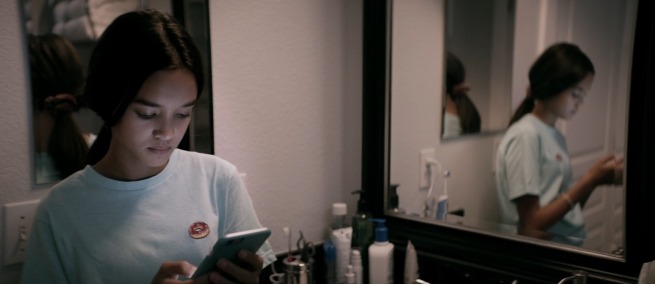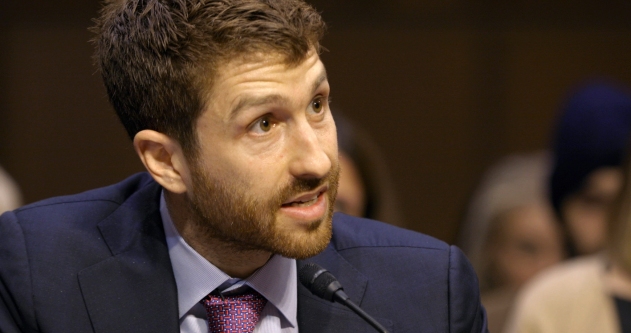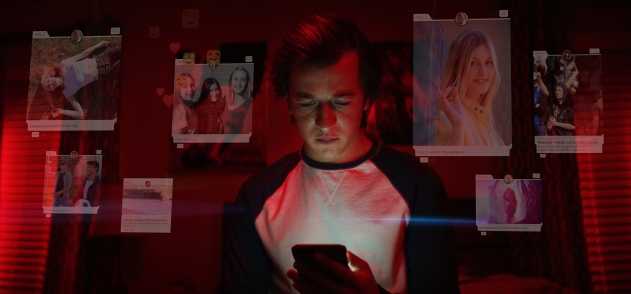
Award-winning documentary filmmaker Jeff Orlowski (CHASING CORAL) examines the cultural dependence on social media and its addictive nature in his new film THE SOCIAL DILEMMA, which Netflix will release on September 9. THE SOCIAL DILEMMA juxtaposes interviews of tech insiders with a dramatization of how machine algorithms target individuals. When the film premiered at the 2020 Sundance Film Festival, we sat down with Orlowski to disucss the film and the issues that it raises. That interview is republished in full below.
Science & Film: Your other films, CHASING ICE and CHASING CORAL, have been centered on environmental issues. THE SOCIAL DILEMMA takes on the tech world. What provoked the shift?
Jeff Orlowski: Always motivating me is the question, what are the biggest stories of our time? Climate change has been at the top of that list. With CHASING ICE, I had the good fortune and benefit of joining a team that was on a climate related project, that’s what turned me into a climate activist of sorts, and that continued with CHASING CORAL. But those projects were motivated by wanting to tell a story about this huge issue nobody knows about.
With that same philosophy in mind, I started hearing about concerns about our technology from friends of mine from college. They were saying that this is an existential threat and I was like, what the hell are you talking about? How is social media an existential threat? That started a journey of two years of talking to a bunch of insiders who built the technology and said, yes, this is actually ripping apart the fabric of society. It’s changing the way we think, the way we see and understand the world, estranging our relationship to truth, and it’s doing it at scale.
All of the benefits that tech companies have espoused about how awesome they are, are dismantling society that much faster. When I started learning about that, it was a huge wakeup call. It realigned my entire understanding and perspective on the tech companies that I loved, that my friends worked at and still work at, and it was a bit of a reckoning of, wait a second, there is a truth to this that we need to confront and address and acknowledge. There isn’t as much of a perfect scenario as we would’ve liked to have thought. In the last year or so we’ve been seeing a tech backlash in different ways. With Facebook–and with a handful of companies– being the one that’s criticized the most. Some of our subjects sparked that backlash a couple of years ago–they were trying to critique the business model, critique the way that these platforms are designed, critique persuasive technology. That’s what put us on this journey that led to the film.
If you read Malcolm Gladwell’s Outliers, he has a whole section about how Bill Gates and Steve Jobs and Paul Allen were of this particular time in history when everything lined up for them to become who they became, and I think in the mid-2000s the same thing happened. People came out of great schools that understood the technology well enough to take advantage of building and developing apps. They knew how to code and were able to build something that found crazy awesome success in ways that nobody expected.
S&F: In the film, there is a really good point that the argument that social media is just a tool doesn’t hold any sway because these are companies with agendas that are trying to manipulate behavior in the real world. They’re not neutral.
JO: That’s one of the things that freaked me out the most. When talking with executives from Twitter and Facebook, the fact that they can dial up the revenue; they have a control for advertising and a control for how much money they pull in and if they’re not hitting their numbers for a quarter, they can make more money, or choose not to hit their numbers, it seems. And to have that power and influence is crazy. The argument that they are neutral tools, I think I wanted to believe that in the past, but I just don’t have that perspective anymore.
S&F: The narrative part of THE SOCIAL DILEMMA, with the three men in the background choosing what the main character sees on his phone and different ways of getting and keeping his attention was really effective. In the past day since I’ve seen the film, I find myself second-guessing my habits of looking and thinking about what’s behind them…
JO: That’s awesome, that’s great. Let me ask you some questions please. How do you feel when you look at your phone now? Is there anything different for you?
S&F: One of the things you hope–which I’m curious if it was a motivation for you in making the film–is that awareness is the first step toward changing behavior. But, watching your film, all the people who are talking who understand much more deeply than any users could how the technology works, still seem to be struggling with their own addiction. So I wouldn’t say that my awareness has led necessarily to a change in behavior, but it’s definitely made me uncomfortable.
JO: And I think that’s my hope, is that you look at your phone after you see the film, you just think of it in a different way. You might ask, why am I seeing these notifications? What’s actually pulling the levers behind the scenes? That was one of the driving curiosities for me: how do you give the public a way to think about the invisible stuff happening on the other side of your screen? It’s something we tried to do with CHASING ICE and CHASING CORAL; there are these stories that you can’t easily see, so how do you reveal the invisible? With this film, when we started learning more about the algorithms, how they work, why they work, what they’re optimized for, how machine learning works in general, and then thinking that we are on the other side of the biggest societal experiment to ever be conducted, almost three billion people… We don’t know what the full outcomes are going to be. We don’t know what the ramifications of social media are on society. We are being tested upon constantly for somebody else’s financial gain, and we are the unwitting victims in this process where the more we feed it data, the better it is at outsmarting us. And that’s the scary part, using it makes it better at dismantling us. Any time I opened any of my social media apps, I felt like I was being used–like if I touched a social media app, there was a point while filming that I was like, ugh. I felt this grossness.

Tristan Harris in THE SOCIAL DILEMMA. Image credit: Exposure Labs/Netflix
S&F: Has that persisted?
JO: I haven’t touched any social media in the last year and a half. I don’t know when my last post was. Facebook was my weakness. Around the election I was super addicted to Facebook, and around that time we started working on the film. I could feel the pull, I could feel when I wanted to use it. You can argue whether its habit or addiction, but I had to do the same things that you learn about changing habits. I removed the Facebook app from my phone. I replaced it with a news app in that same spot so, if I wanted to go to Facebook, instead I went to a news app. Then slowly weaned myself off of that pull, that notion of, I’m searching for… what am I searching for? Why am I going to this phone to fill some void in my life right now, and do I really need it to do that? And is it really doing that [filling that void]? I still catch myself, I still bring my phone to bed when I don’t want to at times, and it’s an ongoing process for everybody but I think, like you said, awareness is the first step. Recognizing that these are not neutral tools, and they have their own intentions and their own goals.
S&F: In terms of raising funds for the film, I have to ask if you took any from companies that are involved in the tech/social media industry?
JO: Great question. Our team turned down money that I thought might be questionable, mostly just to protect the film. We raised the money completely independently, and a number of people through the Sundance Catalyst Community helped as well. I have final cut over film. It’s an independent film through and through, and I had countless debates with lots of different people about what points we were trying to make. We fought tooth and nail with my editors and my writers and producers and EPs wanting to get to the intellectual truth of what we were trying to say. So I feel very good about what’s in the movie right now. I stand by all of it.
S&F: Did you encounter any resistance from people you interviewed about speaking on camera?
JO: There are people who were nervous, and people who you could call whistleblowers, who don’t think of themselves as whistleblowers necessarily, who were inside these companies for so long. It’s hard to come out against a company you worked at and maybe loved, or still do have feelings for in some way. I went to Stanford and it’s through my college experience that I met a bunch of people who are in the movie. Then through them I was connected to more and more people who are at the tech companies.
I think there are lots of people in Silicon Valley who are still figuring out how to feel about this technology. There are people who are still reckoning with it. Like that Upton Sinclair quote, “It is difficult to get a man to understand something, when his salary depends on his not understanding it.” I mean, the amount of money you can make working at these companies is exorbitant. We’re hearing about executive salaries in the five to seven million range annually, and far more than that. But I think there’s an argument that people are making now, which is that the business model is fundamentally an unethical business model, and that we have to rethink the entire way social media and our information technology platforms operate.
 Skyler Gisondo as Ben in THE SOCIAL DILEMMA. Image credit: Exposure Labs/Netflix
Skyler Gisondo as Ben in THE SOCIAL DILEMMA. Image credit: Exposure Labs/Netflix
S&F: Do you see the way forward as a shift in business model, or perhaps some sort of regulation, or in alternatives such as DuckDuckGo or Mozilla that already have different business models?
JO: For our impact campaign that we’re starting to develop, we’re looking at three big branches between how the tech is made, how the tech is regulated, and how the tech is used. We want to figure out how we can have the most impact on each of these issues. How the tech is made I think is one of the interesting ones, because these friends that work at tech companies, such as Tristan Harris who is one of our main subjects in the film and who has been working very actively within Silicon Valley with his organization the Center for Humane Technology trying to change it from the inside. I think the fastest way to change is to change the way that it’s made. That’s one of the conversations we really want to push and promote. I also think there is a huge opportunity for regulation; this is an industry that’s never been regulated. This industry has actively dismantled regulation that we have had in society through the FDC or in other places that exist on other platforms. In many ways we’ve gone backwards. How do we help protect kids? How do we protect elections? And how do we protect our society as a whole through smart regulation, and in a bipartisan way?
♦
THE SOCIAL DILEMMA is written and directed by Jeff Orlowski, co-written by Vickie Curtis and Davis Coombe, and produced by Larissa Rhodes. Netflix will release it for streaming on September 9.
TOPICS